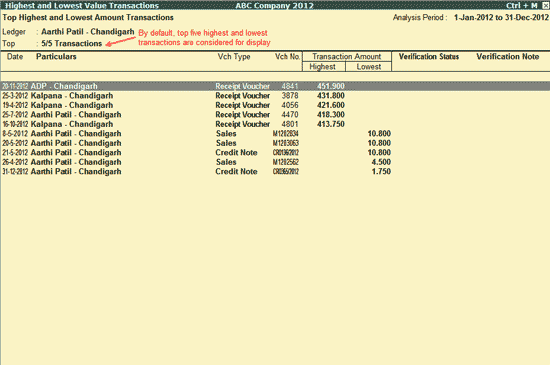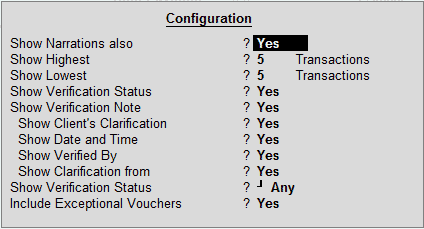
The Highest and Lowest Value Transactions report provides ledger-wise Highest and Lowest amount transactions along with the Difference Range and Difference Range Percentage.
To view Highest and Lowest Value Transactions report
1. Go to Gateway of Tally > Analysis & Verification > Data Analysis > Highest and Lowest Value Transactions.

Note:
1. Difference Range: It is arrived by considering the Highest and Lowest Value Transaction of each ledger. Example: For ABC Bank Ledger,
* Highest Value Transaction is 1000
* Lowest value transaction is 200
Difference Range of ABC Bank (800) = Highest Value (1000) - Lowest Value (200)
2. Difference Range Percentage: It is arrived by dividing the Difference Range by Lowest value of a Ledger. Example: For ABC Bank Ledger,
* Lowest value transaction is 200
* Difference Range is 800
Difference Range Percentage of ABC Bank (400%) = Difference Range (800)/ Lowest Value (200)
The report displays the Highest Transaction Amount, Lowest Transaction Amount, Difference Range and Difference Range Percentage of all Ledgers. Users can drill down from the above report to view ledger-wise Highest and Lowest Value Transactions.
To view the Ledger-wise Highest and Lowest Value Transactions report
● Select a Ledger and press Enter.

The basis for display of Highest and Lowest transactions for a ledger is also displayed on top of the screen.
Note: To display the Highest and Lowest Value Transactions for a ledger, by default 5 Highest value and 5 Lowest value transactions has been set.
Users can configure the display of Highest and Lowest Transactions by clicking on F12: Configure and alter the numbers to show highest and lowest transactions.
Click F1: Detailed or press Alt+F1to view the detailed Highest and Lowest Amount Transactions report.
Click F2: Period or press F2 to change the selected period.
Click F4: Ledger or press F4 to select a different ledger and display the Highest and Lowest Amount Transactions report for the selected ledger.
Click F8: Show Ledger or press F8 to display the default ledger vouchers report for the selected party along with the details of the Opening Balance, Current Total and Closing Balance.
Click F9: Verify or press Alt+F9 to verify the selected vouchers.
Note: The F9: Verify button will be highlighted only when one or more vouchers are selected for verification using Spacebar.
Click Ctrl+F10: Remove Verify or press Ctrl+F10 to change the Verify Status for the selected vouchers as not verified.
Click S: Set Manual Sampling or press Alt+S to mark the selected Vouchers (using Spacebar) as sampled. The manual sampling method will get applied to all such Vouchers and they will appear under the sampled column on the dashboard.
Click D: Delete Manual Sampling or press Alt+D to delete the Manual sampling method already applied for the selected Vouchers (using the Spacebar key).
Click W: Working Note or press Alt+W to specify the working note details at Company or Group or Ledger or Voucher level. The details provided in working note will be captured in Working Paper along with the details of User Name, Working Note Date and Time, Status, Note and so on.
To view the Working Paper during analysis, click Ctrl+W: Wkg Paper or press Ctrl+W. The details displayed in Working Paper will be relevant to report from where it is triggered.
Click F9: Inv Reports or press F9 to navigate to the default Inventory Reports.
Click F10: Acc Reports or press F10 to navigate to the default Accounting Reports.
Click F10: Analysis Reports or press Alt+F10 to navigate to the other Analysis Reports.
Click F12: Configure or press F12 to change the default view for the above report.

● Show Narrations also: Set this option to Yes to display the Narration entered by the Client during the Voucher entry.
● Show Highest: Define the Number of Highest Value Transactions to be considered for displaying in the report.
● Show Lowest: Define the Number of Lowest Value Transactions to be considered for displaying in the report.
● Show Verification Status: Set this option to Yes to display the Verification Status as selected by the user during the analysis. This option is set to Yes by default.
● Show Verification Note: Set this option to Yes to display the Verification Note as entered by the user during the analysis. This option is set to Yes by default.
● Show Client's Clarification: Set this option to Yes to display the Clarification Note entered by the user for the Vouchers marked as Need Clarification by the user.
● Show Date and Time: Set this option to Yes to view the date on which, and time at which, clarification was provided for the listed Vouchers.
● Show Verified By: Set this option to Yes to view the person who has performed verification on the Vouchers.
● Show Clarification from: Set this option to Yes to view the user who has provided clarification, if any, for the Vouchers.
● Show Verification Status: Select a Verification Status and the Vouchers that have been marked with the chosen Verification Status will be filtered and displayed.
● Include Exceptional Vouchers: Set this option to Yes to include Vouchers marked as Optional in this report.
Click F12: Range or press Alt+F12 to use the Range Filter option to search the specific vouchers from the list of vouchers under each Voucher Type.
Click Ctrl+F12 or press Ctrl+F12 to filter the vouchers and calculate the balances as per the specified conditions.